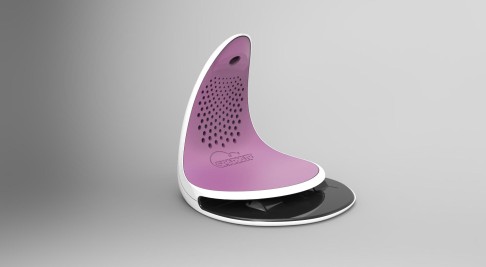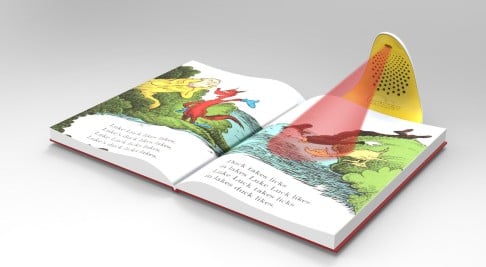
The gadget for reading aloud to your kids when you can't be there
An entrepreneur who wanted to read to his daughters when he wasn't at home has come up with a device that enables him to do that
Becoming a father not only gave Israeli entrepreneur Amir Koren different priorities in life, it also led to Sparkup, an educational technology venture that he started with friend and business partner Roei Simantov.
The pair had been running entertainment-related businesses since their teens - organising events, parties and the like - but parenthood brought a different lifestyle and new perspectives. In particular, Koren was struck by a friend's practice of recording himself reading children's books so that his young daughters could still enjoy "story time" with him whenever he had to go away for training as an army reservist.
"It was such a brilliant idea," Koren says.
Building on the concept, the partners at Sparkup created a device called the Magical Book Reader, which allows parents or other family members to record stories so that they can "read aloud" to children even when they are away on trips or bogged down by other duties.
The gadget is fitted with a digital camera and clips on to the back of conventional books. Once the device is turned on, it scans and recognises the page, then plays the corresponding voice recording as the child advances at his or her own pace through the book. And because its technology is image-based, the device can be used for recording multiple languages, making it useful for second-language learning, too.

At a time when most people have anecdotes of how quickly toddlers take to touch screens, designing a reading device that steers young children away from digital screens might seem counter-intuitive. But the Sparkup partners believe they have the right approach.
"So many kids now play with tablets or smartphones when they are really young, but physical books are important because they slow you down, allow you to imagine things," says Koren, who has two young daughters.
He says that many young children resist reading on digital devices, preferring fast-paced games with attractive images instead of e-books or story apps, so it's especially important to enhance the reading experience of printed books.
"When the iPad was launched in 2010, people told me that developing a reading device for real books was crazy," Koren says. "But the growth in e-books in the past decade has mostly been in the adult market, with the children's market growing little. Children simply don't read much on tablets."
With the seed funding from an accelerator programme at the Centre for Educational Technology in Israel, Koren tested Sparkup's reading device in a pilot programme with kindergartens in the country four years ago. Studies found markedly increased levels of engagement when the Israeli preschoolers were using the reader. Even more encouragingly, they kept an enhanced enthusiasm for reading even after the novelty of the devices wore off.
"I was amazed," says Koren, who was in Hong Kong recently to attend a tech conference. "The kids were lining up to get more storybooks from their teacher."
Buoyed by results from the pilot studies, the device brought in revenues of US$1 million in its first year of sales (markets range from Australia and South Korea, to Britain, France and the US).
Sparkup has since repositioned itself as a cloud-based educational platform and developed a second-generation reader that is scheduled to be launched in China next year. Connected to a huge online library on a cloud server, the new device will no longer store files locally. Whenever it is attached to a book with a corresponding recording stored on the cloud, it will play the recording with no downloads necessary.
As with many sectors, China presents great opportunities for expansion. Sales of children's books on the mainland have growing at an unparalleled rate of 10 per cent annually. With Chinese parents heavily invested in their children's education and a stressful learning environment in China, Koren reckons there is a niche for a device that engages children in reading for pleasure.

Their second-generation device will offer access to Sparkup's cloud library of about 1,000 professional recordings of English-language children's books, provided in collaboration with US publishers keen to enter the China market. Recordings of many Chinese and bilingual books will also be available thanks to the rapidly growing Chinese-language children's book market.
Sparkup's second-generation device works on a premium model: the gadget will retail at an affordable price (yet to be set), but users must pay a monthly subscription to access its cloud library.
What makes the cloud-based platform innovative, however, is its crowdsourcing element. Any parent, teacher or child with the device can upload their own recording of a book and share it with users round the world, making the library virtually limitless. As with many other crowdsourcing platforms, users are given incentives to share their recordings, for example, by awarding points that can be redeemed for subscription rebates.
Points can be accrued if a user offers a reading of a book that had never been recorded, or if a particular reader's version of a book proves especially popular among other users. "It is almost like a storytelling ," Koren quips. "The more popular your recording, the more points you get."
The new device can also have other applications in education. Its wireless technology facilitates the collection of data, such as the amount of time a child spends on each book or page, which can be retrieved by parents and teachers on an app to learn important things about the child's reading patterns.
"If a child is flipping through a book quickly, maybe the vocabulary is too easy for them," says Koren.
Data aggregated from Sparkup users could also be used to facilitate broader analyses of trends in childhood literacy, improve second-language teaching and special-needs education worldwide.
"We see Sparkup more as a mission than pure business," says Koren. "There is huge potential for us to contribute to the way children learn to read and the way parents and educators help them."
In an age of e-books and tablets, Sparkup's success shows technology can still be harnessed to bring out the imagination-stirring power of printed books.
